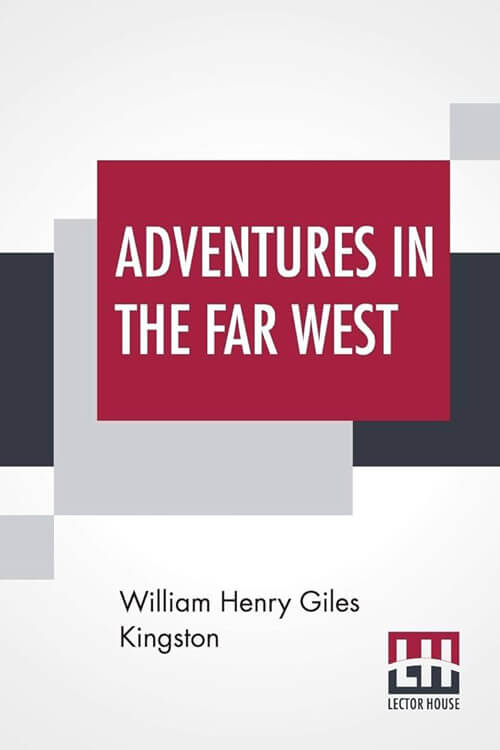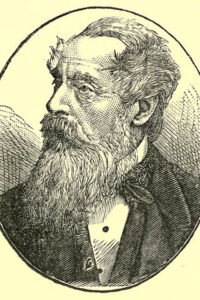
Adventures in the Far West
“I say, didn’t you hear a cry?” exclaimed Charley Fielding, starting up from the campfire at which we were seated discussing our evening meal of venison, the result of our day’s hunting. He leaned forward in the attitude of listening. “I’m sure I heard it! There it is again, but whether uttered by Redskin or four-footed beast is more than I can say.”
We all listened, but our ears were not as sharp as Charley’s, for we could hear nothing.
“Sit down, Charley, my boy, and finish your supper. It was probably fancy, or maybe the hoot of an owl to its mate,” said our jovial companion, Dick Buntin, who never allowed any matter to disturb him, if he could help it, while engaged in stowing away his food.
Dick had been a lieutenant in the navy and had knocked about the world in all climes, and seen no small amount of service. He had lately joined our party with Charley Fielding, a fatherless lad whom he had taken under his wing.
We, that is Jack Story and myself, Tom Rushforth, had come out from England together to the far west, to enjoy a few months’ buffalo hunting, deer stalking, grizzly and panther shooting, and beaver trapping, not to speak of the chances of an occasional brush with the Redskins, parties of whom were said to be on the war-path across the regions we intended to traverse, though none of us were inclined to be turned aside by the warnings we had received to that effect from our friends down east.
We had been pushing on further and further west, gaining experience, and becoming inured to the fatigues and dangers of a hunter’s life. Having traversed Missouri and Kansas, though we had hitherto met with no adventures worthy of note, we had that evening pitched our camp in the neighborhood of Smoky-hill fork, the waters of which, falling into Arkansas, were destined ultimately to reach the far-off Mississippi.
We had furnished ourselves with a stout horse apiece, and four mules to carry our stores, consisting of salt pork, beans, biscuit, coffee, and a few other necessaries, besides our spare guns, ammunition, and the meat and skins of the animals we might kill.
Having, a little before sunset, fixed on a spot for our camp, with a stream on one side, and on the other a wood, which would afford us fuel and shelter from the keen night air which blew off the distant mountains, we had unsaddled and unpacked our horses and mules, the packs being placed to form a circular enclosure about eight paces in diameter.
Our first care had been to water and hobble our animals, and then to turn them loose to graze when we considered ourselves at liberty to attend to our wants. Having collected some dry sticks, we lighted our fire in the center of the circle, filled our water kettle, and put on our meat to cook. Our next care had been to arrange our sleeping places. For this purpose, we cut a quantity of willows that grew on the banks of the stream hard by, and we each formed a semi-circular hut, by sticking the extremities of the osier twigs into the ground, and bending them over to form a succession of arches.
Read or download Book
W. H. G. Kingston
William Henry Giles Kingston was born in Harley Street, London, on February 28, 1814.
Biography.
He was the eldest son of Lucy Henry Kingston (d.1852) and his wife Frances Sophia Rooke (b.1789), daughter of Sir Giles Rooke, Judge of the Court of Common Pleas. Kingston’s paternal grandfather, John Kingston (1736–1820), was a Member of Parliament who staunchly supported the Abolition of the Slave Trade despite having a plantation in Demerara. His father Lucy entered into the wine business in Oporto, and Kingston lived there for many years, making frequent voyages to England and developing a lifelong affection for the sea.
He was educated at Trinity College, Cambridge, and afterward entered his father’s wine business. However, he soon indulged in his natural bent for writing. His newspaper articles on Portugal were translated into Portuguese, and assisted the conclusion of the commercial treaty with Portugal in 1842, when he received from Donna Maria da Gloria an order of Portuguese knighthood and a pension.
His first book was The Circassian Chief, a story published in 1844. While living in Oporto, he wrote The Prime Minister, a historical novel based loosely on the life of Sebastião José de Carvalho e Melo, 1st Marquis of Pombal, and Lusitanian Sketches, descriptions of travels in Portugal. Settling in England, he interested himself in the emigration movement, edited The Colonist and The Colonial Magazine and East India Review in 1844, was honorary secretary of a colonization society, wrote Some Suggestions for a System of General Emigration in 1848, lectured on colonization in 1849, published a manual for colonists entitled How to Emigrate in 1850, and visited the western highlands on behalf of the emigration commissioners. He was a zealous volunteer afterward and worked actively for the improvement of the condition of seamen. But from 1850, his chief occupation was writing books for boys or editing boys’ annuals and weekly periodicals.






